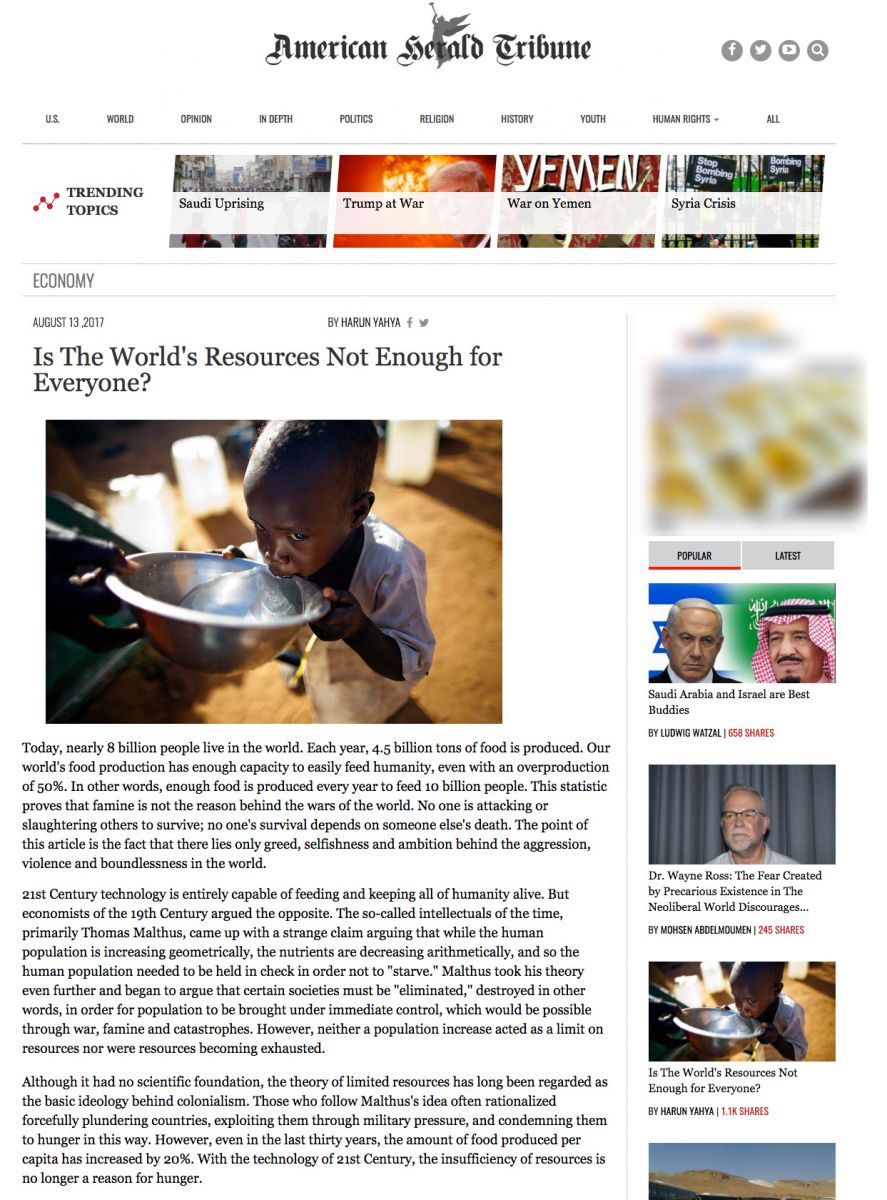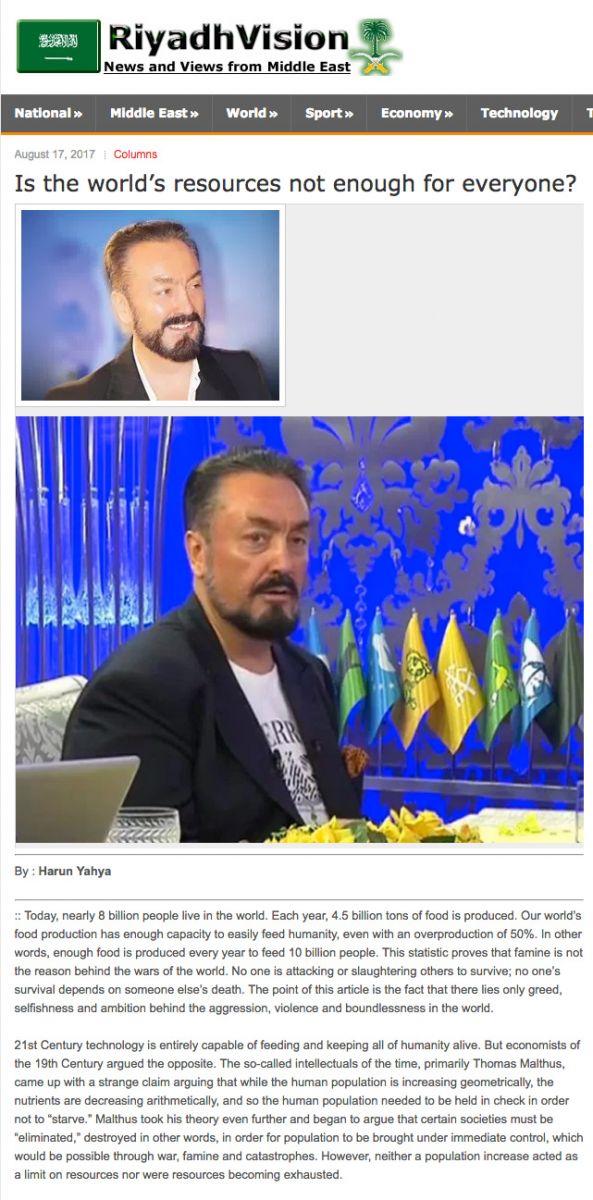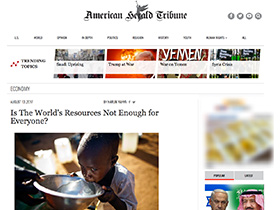
Today, nearly 8 billion people live in the world. Each year, 4.5 billion tons of food is produced. Our world's food production has enough capacity to easily feed humanity, even with an overproduction of 50%. In other words, enough food is produced every year to feed 10 billion people. This statistic proves that famine is not the reason behind the wars of the world. No one is attacking or slaughtering others to survive; no one's survival depends on someone else's death. The point of this article is the fact that there lies only greed, selfishness and ambition behind the aggression, violence and boundlessness in the world.
21st Century technology is entirely capable of feeding and keeping all of humanity alive. But economists of the 19th Century argued the opposite. The so-called intellectuals of the time, primarily Thomas Malthus, came up with a strange claim arguing that while the human population is increasing geometrically, the nutrients are decreasing arithmetically, and so the human population needed to be held in check in order not to "starve." Malthus took his theory even further and began to argue that certain societies must be "eliminated," destroyed in other words, in order for population to be brought under immediate control, which would be possible through war, famine and catastrophes. However, neither a population increase acted as a limit on resources nor were resources becoming exhausted.
Although it had no scientific foundation, the theory of limited resources has long been regarded as the basic ideology behind colonialism. Those who follow Malthus's idea often rationalized forcefully plundering countries, exploiting them through military pressure, and condemning them to hunger in this way. However, even in the last thirty years, the amount of food produced per capita has increased by 20%. With the technology of 21st Century, the insufficiency of resources is no longer a reason for hunger.
In the 20th Century, economists such as Britain’s John Maynard Keynes tried to put Malthus' theories into practice. This propaganda was also the driving force behind the oil wars of the second half of the century. In the 1970’s, hundreds of articles and so-called scientific reports were prepared suggesting that the world's oil reserves would be depleted the 2020s. Greedy and ambitious politicians, soldiers and government officials always based their occupations and massacres on this assertion.
Today we know that the world is full of fossil fuel that will last for much longer, despite the overall increase in consumption; granted, it will be more difficult to extract, yet technological developments have allowed for this. However, the ambition for wealth that spread through colonialism seemed incapable of slowing down in the 18th and 19th Centuries and turned the 20th Century into a bloodbath as well.
Thus the question, "why is 12% of the world’s population living below the hunger limit today?" comes to mind. Indeed, according to the figures from the World Food Organization, 850 million people are starving today. The answer to this question is greed. Today the world's richest 1% and the poorest 50% have the same wealth. The primary cause of hunger and poverty is that the resources are not being distributed equally or at least in near equal amounts. There is no doubt that a world in which the wealth of the richest 80 people is more than that of billions of people, or even dozens of countries, is suffering from injustice.
The second reason for hunger in the world is wastage. Today, a small minority of the world consumes a large portion of resources - and goes on to squander a good deal of it. Each year, one-third of total global food production is thrown away. 70% of this waste, amounting to some one trillion dollars, is from developed countries. In the Western world, it is estimated that each person wastes approximately 110 kg of food each year, while in Africa this figure is only 9 kg. Food in developed countries is wasted in homes, restaurants and supermarkets, while in developing countries it is disappearing due to transportation and storage problems. As humanity, we waste 45% of vegetables and fruit, 35% of fish products, 30% of the bread, and 20% of the meat and dairy products we produce. This is a veritable mountain of wastage of 2500 meters in height and about 3 kilometers in diameter.
The USA alone throws out 141 trillion calories of food every day. The annual value of this food is equal to 155 billion dollars. In other words, an amount of food four times the annual importation of the entire African continent is being wasted by the American people. In the EU, 90 million tons of food, worth 140 billion euros, a year is thrown out. In Britain alone, 17 million tons of food is wasted annually.
Another important reason is the arms race. Today, the value of weapons sitting in military storage depots is in the trillions of dollars. Countries with raging civil wars became a weapons market. Weapons with increasingly lethal capabilities are simply left in storage to decay for years. While millions of dollars are devoted to killing people, almost no effort is made to keep people alive.
Today, the infrastructure that could feed millions of people in Syria, Iraq, Afghanistan, Libya, and Yemen has been destroyed by bombardments carried out by those who wanted to use the weapons gathering dust in their warehouses. In other words, through war, humanity exhausts its means instead of producing, destroys instead of building.
Today, sensitive people all over the world are trying to produce solutions to the problems mentioned above. But these valuable efforts often fail to produce a lasting solution because it is impossible to obtain lasting improvements unless the mentality that drags humanity into this selfishness is changed. In other words, it is not possible to win against the mosquito without draining the swamp. In our case, the swamp is the materialistic mentality that promotes selfishness, greed and violence. It is the educational systems, the economic models, and social ideologies that dictate these qualities to humanity. Evil cannot survive in a world where the ideologies of destruction give way to peace, where selflessness prevails in the face of selfishness, and where people enjoy sharing rather than hoarding everything. This is the greatest legacy we can leave for future generations.
Adnan Oktar's piece in American Herald Tribune & Riyadh Vision:
http://ahtribune.com/economy/1840-world-resources.html
http://www.riyadhvision.com.sa/2017/08/17/is-the-worlds-resources-not-enough-for-everyone/



